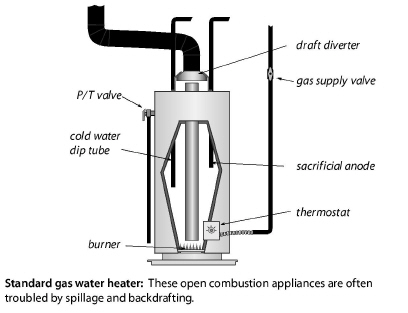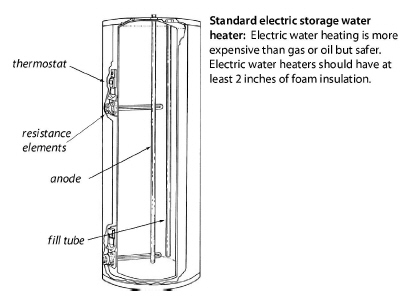
The choice of fuel and model for a storage water heater isn’t easy and it involves many factors including safety, reliability, efficiency, and installed cost.
Conventional direct-fired gas water heaters vent their combustion by-products to a gravity vented chimney. They can spill products of combustion into the living space, especially if the chimney isn’t tall enough, warm enough, or sized properly. Sharing of a main chimney with another combustion appliance can cause venting problems. If the furnace or boiler is replaced with a sealed-combustion or horizontal-vented model, the chimney may then be too big for the remaining combustion water heater.

Electric water heaters have no chimney and need no combustion air, which makes them safer for buildings with low natural air leakage, compared to conventional gas storage water heaters.
Electric water heaters have no products of combustion to worry about. However, because their recovery capacity is generally much less than gas water heaters of the same size, there is a greater chance of someone trying to compensate for a cold shower by setting the electric water heater to an unsafe temperature where occupants could get scalded.
10.10.2 Reliability Comparison
Storage water heaters are popular because they are inexpensive and reliable. Both gas and electric storage water heaters are simpler and more reliable than more expensive and complex water heaters. The lifespan of storage water heaters depends on local water quality and the quality of the water heater’s tank.
Most heaters have glass-lined steel tanks which are typically warranted for five years. All types of heaters are available with larger or additional sacrificial anodes, which are pieces of metal that corrode before the tank does, thereby extending the tank life and maybe the warranty. If you buy a ten-year guarantee heater instead of a five-year guarantee heater, this choice might reduce the future cost of replacement and possible water damage from tank leaks.
10.10.3 Efficiency and Energy Cost Comparison
Conventional gas storage water heaters are rated at about 80% steady-state efficiency. However, whenever a storage water heater isn’t firing, it’s losing heat up the chimney. This happens when cold air, flowing through the heater, is warmed by the heater and escapes up the flue. This off-cycle heat loss reduces annual efficiency drastically and may result in the water heater’s energy factor (EF) being less than 0.60.
The exact EF for a particular storage water heater is difficult to estimate because of many factors including: chimney height, chimney diameter, wind, the home’s air-tightness, outdoor temperature, and water heater temperature setpoint. With these variables the actual EF can vary from 0.60 to 0.40 or even lower. Nevertheless, gas storage water heaters cost less to operate than electric water heaters with the same insulation level.

Electricity is approximately 2.5 times as expensive as natural gas. However, electric water heaters have no chimney and therefore no chimney losses. They do lose heat through the insulation jacket, which brings their EF down to around 0.90. Heat-pump water heaters have an operating efficiency of 200% because they heat water with heat from the surrounding air. But because the electricity production and transmission system in the U.S. is about 31% efficient, the overall energy use and cost for heating water with electricity is still higher than with gas.